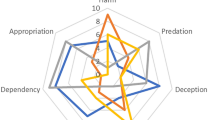Abstract
The current discussion of business ethics is nothing new. In fact it has been a topic of common interest to both researchers and top managers since the mid fifties; the focus adjusting to issues and problems of the times. The authors of the article list four themes they believe to be of relevance for future discussion. First, ethics as an instrument of business behavior is entering a new dimension due to negative side effects of economic activities, which are even observed on a global scale and where it is doubtful that governments can adequately manage this complex environment. From this view, ethics becomes a decisive component of efficiency and requires a new way of thinking on the development of the market system and on a new delineation of responsibilities between government and markets. Second, in the process of transformation of the East-European states it seems to be all the more important to emphasize the ethical characteristics which are part of the concept of competition — the gains to the consumer due to the plurality of search and discovery procedures, the capability to correct and absorb wrong decisions, and the specific distributional ethics. Third, business ethics as an element of the firm's “guiding vision” has to be incorporated into its corporate culture, which will foster an institutional ethic of the firm — the joint effect of individual ethics within the history of the firm coupled with time and experience. Fourth, conflicting business philosophies must be judged with reference to the process of communication of business ethics. Summing up business ethics has a micro and macro component and is related to the individual firm as well as to the structure of the economic and social order. Ethics will, however, have a limited effect if it is not accompanied by the change in goals, structures and processes.
Similar content being viewed by others
References
Beck, U.: 1986,Risikogesellschaft. Auf dem Weg in eine andere Moderne (The Risk Society: Toward a Different Modernism) (Suhrkamp, Frankfurt/M.).
Böckle, F.: 1991, ‘Individualethik und Ethik institutionellen Handelns’ (The Ethics of the Individual and the Ethics of Institutional Actions), in M. Dierkes and K. Zimmermann (eds.),Ethik und Geschäft. Dimensionen und Grenzen unternehmerischer Verantwortung (Gabler, Wiesbaden), pp. 112–127.
Capra, F.: 1985,Wendezeit. Bausteine für ein neues Weltbild (The Turning Point: Components for a New Conception of the World) (Scherz, Bern).
Committee for Economic Development (CED): 1971,Social Responsibilities of the Business Corporation (CED, New York).
Dierkes, M.: 1984, ‘Gesellschaftsbezogene Berichterstattung: Was lehren uns die Experimente der letzten zehn Jahre?’ (Social Reporting: What Have the Experiments of the Last Ten Years Taught Us?)Zeitschrift für Betriebswirtschaft 54, 1210–1235.
Dierkes, M.: 1988, ‘Unternehmenskultur, Leitbilder und Führung. Versuch einer bewertenden Zusammenfassung der bisherigen Forschung’ (Corporate Culture, Visions, and Leadership: An Attempt at an Evaluative Summary of Research) in P. Meyer-Dohm, E. Tuchtfeldt and E. Wesner (eds.),Der Mensch im Unternehmen (Haupt, Bern), pp. 19–47.
Dohm, H.: 1990, ‘Zum Beispiel: ‘Management by Love” (For Instance: ‘Management by Love’)Frankfurter Allgemeine Zeitung, p. 16.
Friedman, M.: 1970, ‘The Social Responsibility of Business Is to Increase Its Profits’,New York Times Magazine, 32–33.
van Hayek, F. A.: 1978, ‘Competition as a Discovery Procedure’, in F. A. von Hayek (ed.),New Studies in Philosophy, Politics, Economics and the History of Ideas (Routledge & Kegan Paul, London/Henley), pp. 179–190.
Hodges, L. H.: 1966,Geschäft und Moral. Die Soziale Verant-wortung des Unternehmers (Business and Morals: The Social Responsibility of the Entrepreneur) (Gabler, Wiesbaden).
Jonas, H.: 1980,Das Prinzip Verantwortung. Versuch einer Ethik für die technologische Zivilisation (The Principle of Responsibility: An Attempt to Shape Ethics for Technological Civilization) (Insel, Frankfurt).
Kirsch, G.: 1991, ‘Ethik und Stabilität von Institutionen’ (Ethics and the Stability of Institutions) in M. Dierkes and K. Zimmermann (eds.),Ethik und Geschäft. Dimensionen und Grenzen unternehmerischer Verantwortung (Gabler, Wiesbaden), pp. 87–111.
Kumar, B. N. and I. Sjurts: 1991, ‘Multinationale Unternehmen und Ethik’ (Multinational Business and Ethics) in M. Dierkes and K. Zimmermann (eds.),Ethik und Geschäft. Dimensionen und Grenzen unternehmerischer Verantwortung (Gabler, Wiesbaden), pp. 157–186.
North, D. C.: 1990,Institutions, Institutional Change and Economic Performance (Cambridge University Press, Cambridge).
Pearce, D., A. Markandya and E. B. Barbier: 1989,Blueprint for a Green Economy (Earthscan, London).
Ryll, A. and K. Zimmermann: 1989, ‘Der rationierte Umweltschutz oder der diskrete Charme des Profitinteresses’ (Rationed Environmental Protection or the Discrete Charm of the Profit Motive)Jahrbuch für Sozialwissenschaft 40, 45–64.
Tuchtfeldt, E.: 1988, ‘Soziale Verantwortlichkeit: Neue Aufgaben des Unternehmens’ (Social Responsibility: New Tasks of Business) in P. Meyer-Dohm, E. Tuchtfeldt and E. Wesner (eds.),Der Mensch im Unternehmen (Haupt, Bern), pp. 49–79.
Vogel, D.: 1991, ‘Business Ethics: New Perspectives on Old Problems’,California Management Review 33(4), 101–117.
Author information
Authors and Affiliations
Additional information
Meinolf Dierkes is Professor of Sociology at the Technical University of Berlin and Director of the Research Unit “Organization and Technology,” Wissenschaftszenturm Berlin für Sozialforschung (WZB). He is a member of the Committee on Basic Research in the Social and Behavioral Sciences of the National Research Council, Washington D.C. In 1988 the president of the Federal Republic of Germany recognized his contribution by awarding him the Bundesverdienstkreuz. Mr. Dierkes has worked as a consultant to a number of major companies in Europe, establishing management systems to integrate social and ecological considerations in business decision making, developing statements of comparative strategic visions and basic philosophies, as well as designing processes of institutional learning. His most recent book in this field isEthik und Geschäft (co-edited by Klaus Zimmermann).
Klaus Zimmermann is currently professor of economics at the Federal Armed Forces University Hamburg. He was senior economist at the Science Center Berlin during 1976–1985, and assistant professor at the University of Cologne in 1970–1975. His main areas of research are environmental/resource economics, regional economics, industrial economics and public finance.
Rights and permissions
About this article
Cite this article
Dierkes, M., Zimmerman, K. The institutional dimension of business ethics: An agenda for reflection research and action. J Bus Ethics 13, 533–541 (1994). https://doi.org/10.1007/BF00881298
Issue Date:
DOI: https://doi.org/10.1007/BF00881298




